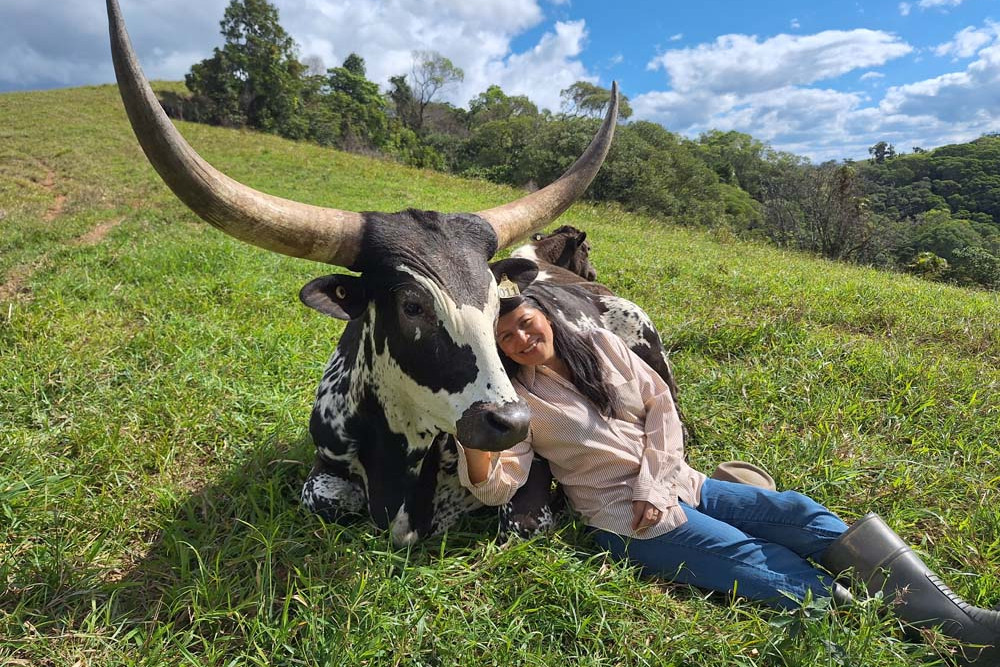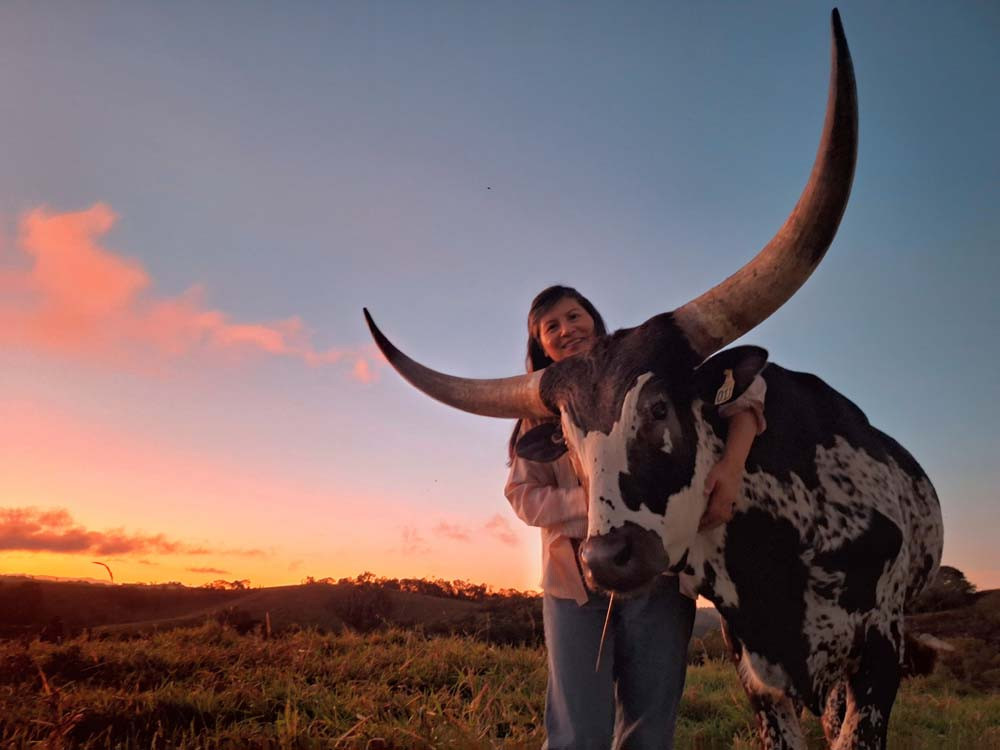On The Land
13 August, 2024
Beautiful horned beasts roam Tarzali hills
THE Long Horn cattle breed has captured the eyes of many for their unique long pointed horns, but for farmers, Dr Jeni Davila Mendez and Reuben Wertz, their long horns are protectors of their low line stud.

Tablelands Lowline Beef in Tarzali was the perfect “accidental” operation after Jeni and Reuben stumbled across a deserted property when moving to the region.
Jeni hails from the heart of Central Mexico, with her hometown, Tehuitzingo, reminiscent of a “scene from a Clint Eastwood western, complete with quaint church towers casting long shadows over dusty streets”.
After completing medical school and embarking on a specialty in obstetrics, she met Reuben, who was raised on a property north of Mossman, had a trade background and was working as a FIFO mining contractor at the time.
After their marriage, Jeni migrated to Australia, became a citizen, and worked hard to get her Mexican medical qualifications recognised in her new home.
A fortuitous phone call led to a position at Malanda Medical Care, and after two years in Malanda, Jeni and Reuben purchased a neglected cattle property, intending to collect rent from the agistment.
However, they soon faced challenges that led them to restock the farm with their own cattle, making it their home and livelihood.
“We call ourselves accidental farmers. Neither of us expected to end up on 200 acres at Tarzali farming Lowline Beef cattle and a quartet of Longhorns,” Reuben said.
“The farm was lacking infrastructure. Fences were few and the yards were falling apart. Not being cattle people we figured we needed a small docile breed that we could handle easily, Lowline simply ticked all the boxes.
“As luck would have it there was a herd for sale near Airlie Beach which got us 32 animals and we grabbed another eight from Cloudbreak Lowlines at Eungella to fill up the truck.”
Farming Lowline was the perfect breed to have on their new property, and with their new herd settling in at home, they thought they were set.
That was until dingos attacked the neighbouring property’s Brahman, giving Reuben and Jeni an unexpected new challenge.
They did some research and stumbled across an unlikely hero – the Long Horn.
“With this in mind, we stopped to visit Mick and Linda Bethal at their Texas Long Horn stud near Charters Towers. We were star-struck by the beautiful colours and amazing horns that the breed is renowned for,” Rueben said.
“Long Horns resulted from survival of the fittest in a really harsh environment. The Iberian stock brought to Mexico by Spanish Conquistadores learned to fend for themselves against cougars, bears, wolves and coyotes.
“We figured they would be perfect guardians for our herd. The Lowlines do a pretty good job of protecting their own anyhow, and after witnessing a few unsuccessful dingo attacks, we stopped worrying.
“It’s been almost four years now and we haven’t lost a single animal to predation.”
Rueben said he and Jeni have favourites among their Long Horns and Lowlines and can often be found cuddling up to them.
Many are “freezer exempt”, including Little Bub, who Reuben raised from a bottle.
“Everyone loves Little Bub, orphaned at birth and raised on a bottle. (He is) now a 360kg Lowline steer who has freezer exempt status,” he said.
“Ice-cream and Travieso with their massive horns, which resulted from crossing Texas Longhorn cows with African Watusi stud bulls (are also favourites).
“We have been very hands-on with these boys since birth because they had potential to be very dangerous - their huge horns are heavy and carry significant momentum.”
“Ice-cream is a real sook. He’ll take a cuddle from anyone. When he’s near the house he will stand at the gate and growl softly until someone brings him a treat.
“Travieso inherited the impatience of his mother and doesn’t like to be disturbed while he is grazing. He prefers me to Jeni for some reason.”
“Reata Rose is Travieso’s mum. She’s tame but you couldn’t call her a pet. Intolerant is probably a good description.
“She is quite happy to eat from your hand and get a scratch but when the food runs out you better have an exit plan because she will try to bully more food out of you!
“Bahati, mother of Ice-cream, has a wonderful temperament that is reflected in all of her offspring. She is a very considerate cow and will tilt her head to avoid hitting you with a horn when she wants to swat a fly on her backside.
“We’ve never seen an injury from the horns. The Longhorns interact well with the Lowlines and don’t like to be separated from their herd.”
Updates on the Long Horns and Lowlines can be found on Rueben and Jeni’s Facebook page.



